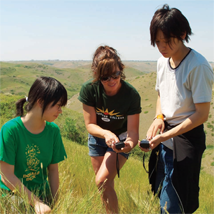Each year for the past dozen, Tokyo mothers have been sending their sons to an arid, windswept plain  where temperatures can easily vary 70 degrees between seasons, Japanese is rarely heard and the nearest of their beloved cherry blossoms are at least two mountain ranges west.
where temperatures can easily vary 70 degrees between seasons, Japanese is rarely heard and the nearest of their beloved cherry blossoms are at least two mountain ranges west.
And each year since they began graduating from its two-year program, Lethbridge College has been sending back to those same mothers sons with a solid grounding in English, an understanding of Canadian culture and the technical training to continue their education at home or abroad.
If this keeps up, tuques may soon be the next Tokyo fashion accessory.
Twelve years ago, the first cohort of nine grads from a Tokyo technical high school affiliated with the Nippon Institute of Technology became the vanguard of a lasting relationship between NIT and Lethbridge College. Once the program was tweaked, students began spending their first year in Blairmore with homestay families, learning English and taking one or two college-level courses toward a General Studies Diploma. In the second year, they attended full classes in Lethbridge. The program has operated much the same since, says Robin Goates, the original program coordinator and now head of Interdisciplinary Studies.
“NIT had purchased the old Blairmore courthouse and renovated it into a learning facility,” says Robin. “It was a heritage building and had to be maintained much as it was originally, so the old jail cells became classrooms.”
As the years passed, NIT purchased an old church that now houses classes.
The students, between 12 and 24 a year, arrive in May for a 12-month stay, studying physical education, math, science, computer technology and chemistry. In the second year, at Lethbridge College’s main campus, they are integrated into regular General Studies classes, their course of study approved by NIT and Lethbridge. The original concept as envisioned by NIT, says Robin, has strayed somewhat.
“NIT officials wanted them to return to NIT to complete their next two years,” she says. “Many still do, but others apply to continue their studies in Canada.”
Jonathan Legg, program co-ordinator and advisor for the past five years, says NIT officials are keen to have their students learn about Canadian culture.
During the first year, homestay is mandatory; it’s optional in the second year. With homestay programs, warm relationships tend to develop between host families and their guests, once a bit of culture shock wears off. Students, particularly the boys, are shown how to change and make their beds and other household responsibilities.
In class, they are encouraged to ask questions and challenge instructors, something unheard of in Japanese schools. Another change, cautiously introduced last year, was the novel – by Japanese standards –inclusion of women into the program.
As for Canadian culture, there are some aspects that require no encouragement.
“They love the freedom of space,” says Robin. “The three to four hours they spend commuting in Tokyo becomes leisure time in Canada. They soon take up skiing and snowboarding, both of which they can do in the Pass, and spending $2,000 at Alpenland is nothing for some of them; of course, handling their own money is a growth issue.”
Add an outdoor activity course involving fishing, hiking and canoeing, and you’ve got your average Canadian lifestyle pretty much constructed. Oh, yes, the hockey: each second-year class in Lethbridge has its own hockey team.
“It’s become a tradition,” says Jonathan. “They also take part in Student Association ski trips and clubs.”
It’s Jonathan’s job to ease any academic or emotional problems that arise and to determine when culture is stifling learning. To date, he’s kept most on track, and NIT is pleased with the results. Four of the 2007 grads are returning to Lethbridge this fall, while two are headed elsewhere in Canada.
“There isn’t a student in the program who doesn’t realize this is a great opportunity,” says Jonathan. “An international education opens doors. They can go back to NIT with two full years’ credit, which has a huge significance, or they can, with an English education in Canada, have so many more opportunities. Universities look at them differently; even though they’ve come from a technical high school program, an international diploma says something about them as learners.”


